
Ibrox Stadium is a football stadium located in Glasgow, Scotland. It is the home ground of Rangers Football Club, one of the most successful and well-supported football clubs in Scottish football history.
Key facts about Ibrox Stadium:
History: Ibrox Stadium was officially opened on December 30, 1899. It has been the home of Rangers Football Club since its inception. The stadium's name "Ibrox" is believed to have been derived from the old district of Ibrox in Glasgow.
Architecture: The stadium's architecture is characterized by its classic design, with four stands surrounding the pitch. The Bill Struth Main Stand, named after one of Rangers' most successful managers, is one of the most iconic stands at Ibrox.
Capacity: As of my last update, Ibrox Stadium had a seating capacity of approximately 50,817 spectators for football matches, making it one of the largest football stadiums in Scotland.
Hosted Events: Ibrox Stadium has hosted numerous important football matches, including domestic league fixtures, Scottish Cup matches, UEFA Europa League matches, and other European competitions.
Accessibility: The stadium's location in Glasgow makes it easily accessible by public transport, including trains and buses.
Historic Significance: Ibrox Stadium holds significant historical importance in Scottish football. It has witnessed many memorable moments in Rangers' history, including numerous domestic league titles, Scottish Cup victories, and European success.
The Atmosphere: Ibrox is known for its passionate and fervent atmosphere during matches. The Rangers fans, known as the "Blue Order" and "The Teddy Bears," are renowned for their passionate support, creating a unique and intense atmosphere during games.
Tragedy: Ibrox Stadium was the site of a tragic disaster in 1971 when a crush occurred on the stairway leading to the terracing, resulting in the loss of 66 lives. The disaster led to safety improvements in football stadiums across the United Kingdom.
Ibrox Stadium is not just a football stadium; it is a symbol of Rangers FC's identity, tradition, and unwavering support from their fans. Its historical significance, iconic stands, and the passionate backing of the Rangers faithful make it a cherished stadium in Scottish football history.
Explore Near Ibrox Stadium Stadium
Discover 5 attractions, 5 cities, and 3 airports within 75km. Perfect for planning day trips, finding connecting flights, or discovering new destinations to explore during your visit.
Nearby Attractions & Places to Visit
5 destinations within 1.3km - 3.6km from your location





Nearby Cities Worth Exploring
5 destinations within 3.5km - 20.7km from your location
Airports Near Ibrox Stadium Stadium
3 destinations within 8.0km - 59.4km from your location
Cross-Border Adventures Near Ibrox Stadium Stadium
Discover cross-border adventures near Ibrox Stadium Stadium. Explore neighboring countries with similar attractions and extend your travel experience across borders.
